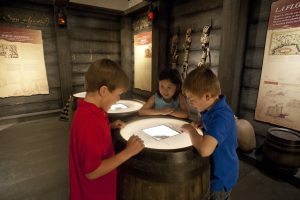
Florida Museum of Natural History photo by Kristen Grace
GAINESVILLE, Fla. — Alachua County fourth-grade students have the opportunity to visit the Florida Museum of Natural History’s new featured exhibit, “First Colony: Our Spanish Origins,” during a two-hour free program beginning Oct. 27.
Designed to support classroom studies, the “First Colony Days” program engages students in learning about the nation’s first colony in St. Augustine through archaeology, history and the stories of people who lived there. Scheduled for 19 dates through January 2016, the program includes hands-onclassroom activities and exploration of museum exhibits.
“Although not that far away, many children have not visited historic St. Augustine,” said Florida Museum program director Betty Dunckel. “Having the exhibit and this program locally available to fourth-grade students provides an exciting opportunity to actively engage them in learning about our nation’s history and the important role of Florida.”
Fourth-grade curriculum includes Florida history, which also details America’s original first European settlement – St. Augustine, established by Spaniards, free and enslaved Africans and Native Americans. This program meets the Grade 4 Florida Standards for social studies and language arts courses.
“Touring a museum gives students the opportunity to be led on an informative, hands-on journey, but also allows students to self-lead and explore many aspects of the museum and exhibit in which they can personalize learning,” said Alachua County Public Schools K-12 curriculum specialist Dustin Adams.
The Florida Museum Associates Board provided funding for the program, including teacher training, classroom resources, bus transportation and exhibit admission, with proceeds from its 2015 “Passport to: Around the World in 80 Days” fundraising gala. The event was specifically organized to raise funds for children’s educational programming through the museum’s Center for Science Learning.
The “Passport to: Caribbean Nights” gala scheduled for Feb. 19, 2016, will continue to benefit museum education initiatives.
For more information on “First Colony Days,” email Betty Dunckel, bdunckel@flmnh.ufl.edu.
-30-
Writer: Maria Espinoza, PRintern@flmnh.ufl.edu
Source: Betty Dunckel, bdunckel@flmnh.ufl.edu
Media Contact: Paul Ramey, pramey@flmnh.ufl.edu, 352-273-2054